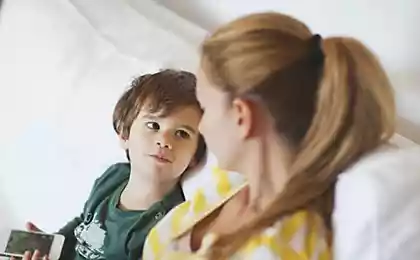515
How to educate the foolish, weak, and deprived of creative abilities of the child
Got me here is an interesting article from Time magazine titled "I taught my children that arguing with me is fine. Big mistake." Below is its translation. And yet — a small Preface.
Now there is a huge amount of literature for parents, which describes how to educate their children. Great literature this throws parents off. Various pseudopsychology advise parents not to tell children "no." Like, God forbid children learn the word "no".
"In using these words," broadcast "psychologists" — you're committing child abuse. You suppress it. You don't want this? You want to grow it strong, with leadership qualities? So, if nothing he does not deny".
In other words, "psychologists" offer parents fully submit to the will of the child.

If it grows in this type of education has a strong personality? Quite the contrary. For a strong-willed man is one who could who above all was able to control himself, who has learned to control her impulses and desires, to overcome laziness, pain, and own weakness. Who was able to bend them to his will.
And to put obstacles to his desires and impulses, he learns in childhood. Through their parents. First, they — the parents — saying "no" to the request of the child all day to watch cartoons. First they teach the child to overcome laziness, telling the child that it is NECESSARY to remove the toys. And then all these "impossible" and "necessary".
The child develops a mental mechanism of self-regulation — the base for the beginning of the formation of the will. Later, when the child becomes older, with the active assistance of the parents, it may use self-regulation for the development of volitional qualities.
Self-control will help him learn to overcome the difficulties: hard to try to understand the hardest math problem, not succumbing to laziness and despondency due to the fact that it is so difficult. Learning to overcome fatigue and pain, he can become strong and agile, to win in sports.
Faced with this unpleasant discovery that not all his desires will be fulfilled and he will learn to think, he will learn to process primitive unpleasant emotions in complex and subtle. And this is the key to the development of CREATIVE thinking. Also, it will be understood that in addition to himself and his desires to have other people and their desires. Sometimes you have to give up your desires for another. These experiences contribute to the development of such qualities as CONSCIENCE.
And only when there were all these qualities — the will, the conscience, the ability to think and has also formed the cultural and intellectual baggage, you have to instill in your child the desire to think critically. Usually, all of these things take some design (although far from complete, of course) in adolescence.
Logically, agree? And is consistent with the laws of mental development. Reaching adolescence, children themselves are beginning hard to argue with their parents. They do not even need to teach it. However, taking into consideration that adolescents are still heavily emotionally immature and inexperienced, it is important to be able to them in appropriate situations need to speak the same "no."
Well, what happens when the child from an early age, do not say the word "no", it is clear from the article. Children are impulsive, uncontrollable. Emotions are usually primitive and immature, they run from any complex cases that require effort. In other words, they are weak and infantile, and never strong personalities will not. So the promised article.

I taught my children that arguing with me is fine. Big mistake.
Darlina Writes Cunha
My sad experience shows that children should be limit, until they become old enough to understand the reason for the restrictions.Raising children is not easy. On every study or statistics telling us how to raise children, there are many studies and data, calling on it to do the exact opposite. How can so essential for the survival of us as a thing to be so complicated?
One such issue is the question of how much freedom to give children in decision-making? A recent article on education portal back to the controversial idea that parents should teach children to argue. Experts, including clinical psychologist Flanagan K. M. (Kelly M. Flanagan), the arguments in favour of allowing children to say "no" to his parents. At the same time, other articles claim that saying "no" is one of the main responsibilities of parents. So who is right?
I have spent years to raise polite debaters. And, being a conventional mother who is afraid to spoil their children, I can tell you that it absolutely didn't work. And I've spent the last year of life of my twins to fix caused me harm. Now they are 7 years old.
When I was little, it seemed to me that I have no right to vote. It was "as parents, or you can go on all four sides". They made the decision, and despite my brilliant arguments and ideas, it was final. It took me all my youth to have a voice and to understand that it's okay to hold opinions and to determine their life goals.
I didn't want my girls went through this. I wish they knew from the beginning that they are important to me are smart and we should listen to them, because in our society women of all ages often face the opposite. I wanted my daughters were able to succeed. If they had a reason to want something or do not want, I wanted to know about it.
But I made a mistake with the time. Indecision parents may be perceived by the children not as a desire to take their interests into account, but as a relief. When the girl 3-4 years, she is waiting for your instructions on what she should do. Even if this objection. A small child needs to know he is safe. What do you keep under control the entire decision-making process. He may believe you when you say.
Until this year, due to the fact that I wanted to nurture in my children independent critical thinking, I set the ban, and then allowed the children to try to break through it. Sometimes I changed my decision, but because the children could not understand the reason for this, I just looked in their eyes uncertain. They learned the result without understanding the decision-making process.
They didn't understand where the boundaries of the ban, so they began to run amok. To meet their desires they have used all possible tricks for children – fell into a rage, stood in a pose, offended, argued, rolled her eyes, threatened. I accidentally missed the situation, and the ship became unmanageable.
It took a year, but when I consistently changed the attitude, children become more reluctant to agree with him. Now I say "No... because I said so" much more often. I had to show them that my authority can be trusted. And they are now happier. They don't yell at me and not calling (mostly).
They no longer fall to the ground, as if forgotten how to walk like before, when they tried at all costs to get me to say Yes. Now they know that calmly and firmly said, "no" means "no." And as they get older, they reach an age where I might be able to allow them to discuss individual decisions taken by me, if they have solid arguments.
What are the consequences of corporal punishment of a childThese words— the worst curse a parent
So, of course, necessary to teach children to respectfully challenge your decisions. However, you should not do it until then, until they're not old enough to cope with this problem until you tell them not convincingly demonstrated that your word is final until, until you decided otherwise, and that you will allow them to discuss this decision with you, if they deserve it.
If you behave in this way, can we call it education "debaters"? I would have said more – effective communicators. published
Author: Darlina Cunha
Translation: Petr Lvov
Source: tachkasmedom.livejournal.com/29947.html
Now there is a huge amount of literature for parents, which describes how to educate their children. Great literature this throws parents off. Various pseudopsychology advise parents not to tell children "no." Like, God forbid children learn the word "no".
"In using these words," broadcast "psychologists" — you're committing child abuse. You suppress it. You don't want this? You want to grow it strong, with leadership qualities? So, if nothing he does not deny".
In other words, "psychologists" offer parents fully submit to the will of the child.

If it grows in this type of education has a strong personality? Quite the contrary. For a strong-willed man is one who could who above all was able to control himself, who has learned to control her impulses and desires, to overcome laziness, pain, and own weakness. Who was able to bend them to his will.
And to put obstacles to his desires and impulses, he learns in childhood. Through their parents. First, they — the parents — saying "no" to the request of the child all day to watch cartoons. First they teach the child to overcome laziness, telling the child that it is NECESSARY to remove the toys. And then all these "impossible" and "necessary".
The child develops a mental mechanism of self-regulation — the base for the beginning of the formation of the will. Later, when the child becomes older, with the active assistance of the parents, it may use self-regulation for the development of volitional qualities.
Self-control will help him learn to overcome the difficulties: hard to try to understand the hardest math problem, not succumbing to laziness and despondency due to the fact that it is so difficult. Learning to overcome fatigue and pain, he can become strong and agile, to win in sports.
Faced with this unpleasant discovery that not all his desires will be fulfilled and he will learn to think, he will learn to process primitive unpleasant emotions in complex and subtle. And this is the key to the development of CREATIVE thinking. Also, it will be understood that in addition to himself and his desires to have other people and their desires. Sometimes you have to give up your desires for another. These experiences contribute to the development of such qualities as CONSCIENCE.
And only when there were all these qualities — the will, the conscience, the ability to think and has also formed the cultural and intellectual baggage, you have to instill in your child the desire to think critically. Usually, all of these things take some design (although far from complete, of course) in adolescence.
Logically, agree? And is consistent with the laws of mental development. Reaching adolescence, children themselves are beginning hard to argue with their parents. They do not even need to teach it. However, taking into consideration that adolescents are still heavily emotionally immature and inexperienced, it is important to be able to them in appropriate situations need to speak the same "no."
Well, what happens when the child from an early age, do not say the word "no", it is clear from the article. Children are impulsive, uncontrollable. Emotions are usually primitive and immature, they run from any complex cases that require effort. In other words, they are weak and infantile, and never strong personalities will not. So the promised article.

I taught my children that arguing with me is fine. Big mistake.
Darlina Writes Cunha
My sad experience shows that children should be limit, until they become old enough to understand the reason for the restrictions.Raising children is not easy. On every study or statistics telling us how to raise children, there are many studies and data, calling on it to do the exact opposite. How can so essential for the survival of us as a thing to be so complicated?
One such issue is the question of how much freedom to give children in decision-making? A recent article on education portal back to the controversial idea that parents should teach children to argue. Experts, including clinical psychologist Flanagan K. M. (Kelly M. Flanagan), the arguments in favour of allowing children to say "no" to his parents. At the same time, other articles claim that saying "no" is one of the main responsibilities of parents. So who is right?
I have spent years to raise polite debaters. And, being a conventional mother who is afraid to spoil their children, I can tell you that it absolutely didn't work. And I've spent the last year of life of my twins to fix caused me harm. Now they are 7 years old.
When I was little, it seemed to me that I have no right to vote. It was "as parents, or you can go on all four sides". They made the decision, and despite my brilliant arguments and ideas, it was final. It took me all my youth to have a voice and to understand that it's okay to hold opinions and to determine their life goals.
I didn't want my girls went through this. I wish they knew from the beginning that they are important to me are smart and we should listen to them, because in our society women of all ages often face the opposite. I wanted my daughters were able to succeed. If they had a reason to want something or do not want, I wanted to know about it.
But I made a mistake with the time. Indecision parents may be perceived by the children not as a desire to take their interests into account, but as a relief. When the girl 3-4 years, she is waiting for your instructions on what she should do. Even if this objection. A small child needs to know he is safe. What do you keep under control the entire decision-making process. He may believe you when you say.
Until this year, due to the fact that I wanted to nurture in my children independent critical thinking, I set the ban, and then allowed the children to try to break through it. Sometimes I changed my decision, but because the children could not understand the reason for this, I just looked in their eyes uncertain. They learned the result without understanding the decision-making process.
They didn't understand where the boundaries of the ban, so they began to run amok. To meet their desires they have used all possible tricks for children – fell into a rage, stood in a pose, offended, argued, rolled her eyes, threatened. I accidentally missed the situation, and the ship became unmanageable.
It took a year, but when I consistently changed the attitude, children become more reluctant to agree with him. Now I say "No... because I said so" much more often. I had to show them that my authority can be trusted. And they are now happier. They don't yell at me and not calling (mostly).
They no longer fall to the ground, as if forgotten how to walk like before, when they tried at all costs to get me to say Yes. Now they know that calmly and firmly said, "no" means "no." And as they get older, they reach an age where I might be able to allow them to discuss individual decisions taken by me, if they have solid arguments.
What are the consequences of corporal punishment of a childThese words— the worst curse a parent
So, of course, necessary to teach children to respectfully challenge your decisions. However, you should not do it until then, until they're not old enough to cope with this problem until you tell them not convincingly demonstrated that your word is final until, until you decided otherwise, and that you will allow them to discuss this decision with you, if they deserve it.
If you behave in this way, can we call it education "debaters"? I would have said more – effective communicators. published
Author: Darlina Cunha
Translation: Petr Lvov
Source: tachkasmedom.livejournal.com/29947.html
The compact crossover BMW X3 will be released in electric versions
Transwarp drive based on the Casimir effect























